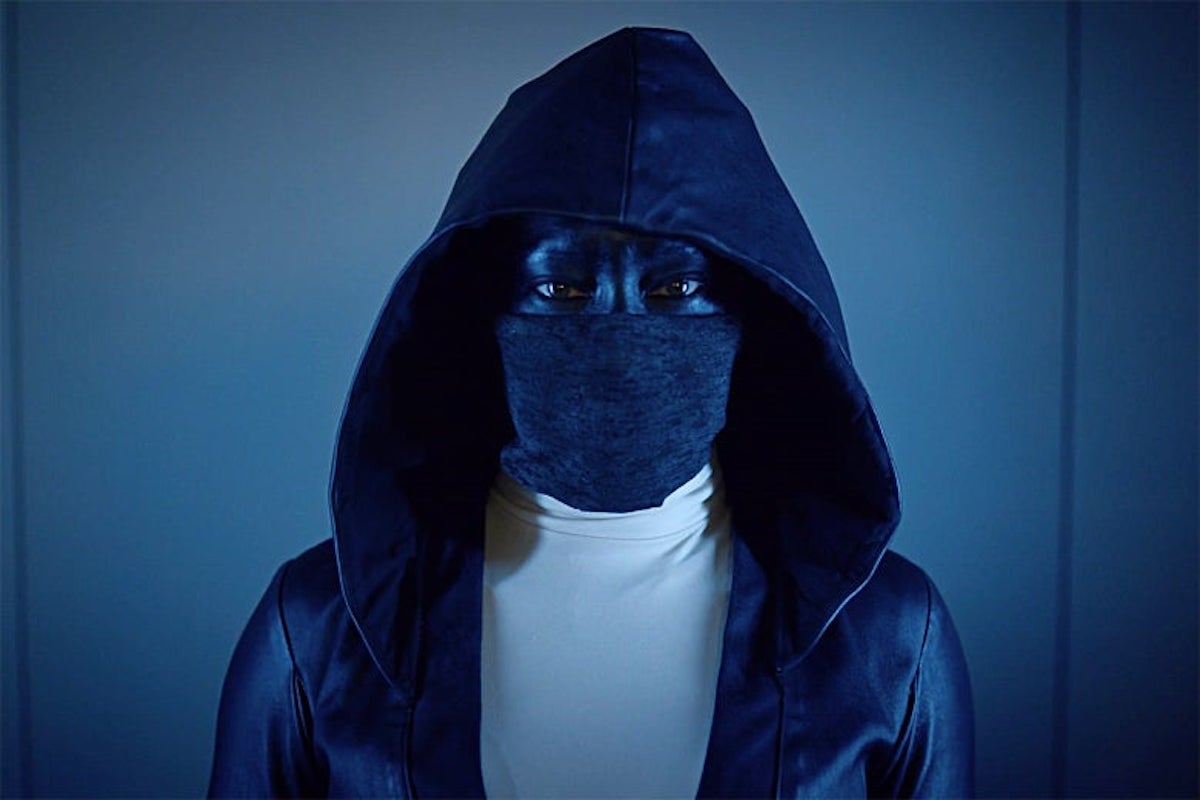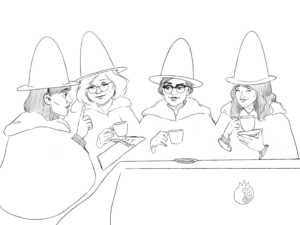Author’s Note: This article discusses crucial plot points and contains spoilers for Watchmen, including the original comics, the film, and the HBO series (obviously). Proceed with all the caution of a society whose Doomsday Clock is about to strike midnight.
Picture it: America, 2009. Zack Snyder has decided that for his follow-up to 300, he’s going to dive into another comic book adaptation — he makes a faithful, nearly identical panel-for-panel translation of Alan Moore and Dave Gibbons’ iconic graphic novel, Watchmen. There is nothing really new or exciting that Snyder adds to his adaptation (save for My Chemical Romance covering Bob Dylan), and it will eventually earn a middling 64% on Rotten Tomatoes. But for high school me, fresh off of reading the novel, it was a kind of revelation, and I was very, very into the whole thing. It felt so deep, so unflinching, so edgy; it made sixteen year old me feel like I was clued in on some wonderful, secret, grown-up world. I loved it unconditionally and uncritically.
Fast forward a decade later: I’ve gotten older and wiser, and a whole new take on Watchmen has emerged, courtesy of HBO and Damon Lindelof (LOST, The Leftovers). But in this age of endless remakes, would this version be any different from the 2009 film? How do you take a story that was once considered unfilmable and turn it into its own limited television series? Thankfully, dear reader, the answers are simple: 1) It is remarkably, exquisitely different and 2) In Lindelof’s own words, “Very carefully and also completely, totally haphazardly.”
The HBO series begins, not with the iconic murder of a shitty Comedian, but with an actual, devastating event: the Tulsa Massacre of 1921, where a section of Tulsa, Oklahoma called Greenwood, and known colloquially as “Black Wall Street,” was destroyed by white Oklahomans conspiring with the city to evicerate what was, at the time, the most prosperous black community in the nation. Hundreds of black people were murdered that day, and thousands more were arrested, detained, and left homeless.
In the chaos of this massacre, we meet Will Reeves — a small boy, who becomes an integral part of this continuation of Watchmen. With this beginning, the series immediately makes its concerns known: even in a comic book universe with godlike beings and annoying squid rainfalls, racism and trauma are inescapable.

We experience and explore this dystopia (an alternate version of 2019) through Angela Abar, a Tulsa detective who also moonlights as Sister Night — a chosen identity in a world where cops always wear masks and detectives can choose to adopt a persona to keep themselves hidden and theoretically safe from vigilantes seeking to target law enforcement. After Angela’s boss, Sheriff Crawford, is found dead — hanging from a tree, with an older Will Reeves by his side in a wheelchair, taking responsibility for the murder — Angela begins an investigation that will lead to discoveries about the world she thought she knew and her own history and identity. She eventually discovers that Reeves is her grandfather, and that revelation begins a reckoning with the past that echoes throughout the series so far.
This iteration of Watchmen, much like its predecessor, seems occupied with the time it’s taking place in, even if the story is set in an alternate version of our timeline. The concerns of the 1986 comic dealt with nuclear annihilation, post-Vietnam War ennui, and cynicism in the middle of an excessive decade. Snyder’s 2009 movie adaptation added nothing to these themes, and left them largely untouched, save for removing the giant squid (which was definitely one of the most cowardly decisions in film history). Thankfully, HBO’s adaptation feels just as revolutionary as the original comic must have in 1986 — a powerful product of its time. This alternative version of 2019 is fearless about voicing its anxieties. It isn’t afraid of getting into the messiness of grappling with trauma. Specifically, the show dives headfirst into how trauma is carried within us and how systemic racism can both cause and perpetuate this trauma across time and space. If there were any doubts that intergenerational trauma was a main concern of this show at the beginning, those doubts get shattered in episode six.
While I was hooked from the start, it was after this episode, “This Extraordinary Being,” that I realized I was witnessing something truly unique. Much like “Part 8” of Twin Peaks: The Return, episode six felt like a seismic turn for the show. In this gorgeous, harrowing black and white journey through a literal Nostalgia trip (memories have been turned into a pharmaceutical that people can abuse and even overdose on), Angela takes her grandfather’s memories and lives through them. She literally connects and is faced with her own intergenerational trauma, beginning a reckoning that we have yet to see the end of. Angela and the audience discover that Will Reeves is not only her grandfather, but was also Hooded Justice, the original superhero who inspired the first group of masked crusaders and has been alluded to in the series-within-a-series American Hero Story: Minutemen — and who had been understood to be white.

Lindelof and company are clearly alluding not only to the literal masks worn by the heroes of this universe, but to the masks we all wear every day, and how layered and complicated they can become for marginalized people and people of color, specifically. For Will Reeves, not only did he have to put on the mask of Hooded Justice to fight crime, he had to put on a mask of whiteness to just be deemed acceptable by the world and even his fellow Minutemen. As Angelica Bastién wrote in Vulture, Reeves “wears two masks, each with its own price.”
Indeed, Will Reeves’s thirst for justice had to be quenched in secret. After his own lynching, Reeves reclaims the noose bag used against him and turns his anger into something righteous. When he arrives home, his wife June tells him “You ain’t going to get justice with a badge, Will Reeves. You’re gonna get it with that hood.” She is, sadly, right. Earlier in his life, Reeves believed in the power of the law enforcement system (as evidenced through his obsession with Trust in the Law, a silent film he saw as a boy), but as he got older, he recognized that things are much more complicated, and that the system he thought he could operate within was designed to exclude him, his family, and everyone who looks like him.
Even when he tries to tackle the same problems as Hooded Justice, Reeves can’t get the support of his fellow Minutemen. “I’m afraid you’re going to have to solve black unrest all on your own,” Captain Metropolis, his lover and co-adventurer tells him plainly. When neither of the masks he wears gets him the justice he craves, Reeves takes matters into his own hands, notably without a mask or a badge, when he kills a group of racists planning to use mesmerism to turn the city’s black population against themselves. In a series that seemed to begin by highlighting a police force as heroes against blatant racists, while not acknowledging the active role the police play in maintaining systemic racism, this is a complete (and welcome) 180.

After this staggering episode, I truly thought there wouldn’t be much left to surprise me, but happily, I was wrong! The Seventh Kavalry, a white supremacist terrorist group inspired by the writings of Rorschach, is trying to harness the power of Doctor Manhattan — in the form of a racist Senator — to uphold their white supremacist bullshit. Oh, and Manhattan just happens to be in Tulsa, in disguise as Cal Abar, Angela’s lovely, loyal husband. Reader, when I tell you I screamed at the end of episode seven, I 100% mean it.
Just when the folks behind the show couldn’t continue to stun me, episode eight came along last week and brought us the story of Dr. Manhattan as we’ve never seen it before. There was a lot to like here! HBO Manhattan actually seems way more sympathetic than the creep from the comics, which is an automatic win. Plus, the show places a ton of agency in the relationship with Angela, a welcome respite from how Manhattan’s relationships in the comics work. Additionally, the episode’s creative editing firmly puts us in the blue man’s shoes: allowing for some insight into how Manhattan experiences time.
It’s thrilling to see this all unfold, in real time, as an adult. That is to say, I haven’t felt this invested in the Watchmen universe since my first viewing of the 2009 movie.

The decade that’s passed between my first encounter with Moore and Gibbons’ world — full of vigilantes dealing with their own traumas by trying to save everyone else — has been a wild one, to say the least. Through the challenges and surprises of the past ten years, a certain growth has happened within me — a growth that recognizes that the “deep” and “unflinching” original Watchmen was much more layered and satirical than I initially read into, but still clearly rife with problems regarding race, class, and gender. But it feels like HBO’s continuation/interpretation/“remix” of the original source material has matured in a similar way.
Re-encountering Watchmen by watching this show and beginning to re-read the original comic has been an entirely new revelation. My living room in Austin is a ways from the South Texas high school gym where I finished reading Watchmen for the first time (both in time and space), and the sixteen year old who loved Snyder’s uncomplicated recreation has grown and changed. The great thing about formative works is that they can be rooted in a moment: a page turned in the bleachers of a basketball game, a laptop screen blinking with credits late at night — but our interactions with them can change over time, outside of those moments. We can return to the same movie years later and sigh when Snyder doesn’t show the Squid, we can open the comic book again and realize Rorschach is actually the worst, but we can also make space for new understandings. At a time when reboots and remakes are feeling more trite, it’s invigorating to have something as subversive, as complicated, and as daring as HBO’s Watchmen.




